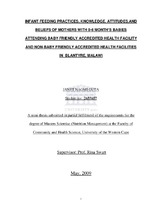| dc.contributor.advisor | Swart, Rina | |
| dc.contributor.author | Guta, Janet Naomi | |
| dc.date.accessioned | 2014-05-22T12:48:02Z | |
| dc.date.available | 2014-05-22T12:48:02Z | |
| dc.date.issued | 2009 | |
| dc.identifier.uri | http://hdl.handle.net/11394/3218 | |
| dc.description | Magister Scientiae (Nutrition Management) - MSc(NM) | en_US |
| dc.description.abstract | The Ministry of Health in Malawi promotes exclusive breastfeeding for the first six months of life and continued breastfeeding with appropriate complementary feeding up to two years or beyond. This policy applies to all children unless there are medical indications. Baby Friendly Hospital Initiative (BFHI) is a strategy that contributes to the attainment of this policy. BFHI is a strategy to increase early and exclusive breast feeding rates among mothers. This study is a pilot to evaluate the success of the BFHI initiative in Malawi.Study design. A cross- sectional cohort study of women and their infants, 0-5 months,attending BFHI and non-BFHI accredited health facilities in Blantyre district of Malawi ] between the period from 28th April to 30th September, 2008 was conducted.Data Collection: An in-depth face-to-face interview using an open-ended structured questionnaire was conducted among 202 mothers of infants within the first week of birth.A convenient sample of 102 mothers was selected from prima gravida mothers at a semiurban BFHI accredited facility while the other 100 were from semi-urban non-BFHI accredited facilities. This sample was used for the descriptive component of the study.From the 202 mothers, 30 from the BFHI and 30 from the non-BFHI Accredited health
facility(s) were selected randomly as the sample for the longitudinal cohort of the study at 3 and 5 months respectively.Analysis of results: Data was analyzed using SPSS for Windows. Frequencies were tallied for categorical variables and mean standard deviations were computed for continuous variables. Chi-square p-values with health facility type as classification were
computed to determine the difference between BFHI and non-BFHI accredited health facility groups for all relevant variables.Results Exclusive breastfeeding rates differed significantly (p- value, 0.0000) within one week
after birth (99% for the BFHI versus 68% for the non-BFHI facilities).Thirty percent of the mothers from the BFHI accredited health facility practiced exclusive breastfeeding up to 5 months as compared to none of the mothers in non-BFHI accredited health facilities.All 202 mothers had ever breast feed in both facilities throughout the 5 months study period.Mothers and mothers-in-law were the significant source of complementing breast
milk before 6 months of age,[ 25% more influence of mothers and mothers in-law in the non-BFHI accredited facility when compared to BFHI accredited facility].Conclusion:The BFHI strategy has the potential to successfully influence mothers to adhere to global and national recommendations on optimal breastfeeding practices. Special efforts should be made to continue support of and provide information to new mothers during the first week after delivery and unto few months after birth as mothers seem to introduce
complementary foods early and prior to the recommended period of 6 months. | en_US |
| dc.language.iso | en | en_US |
| dc.subject | Baby friendly hospital initiative | en_US |
| dc.subject | Breast feeding | en_US |
| dc.subject | Exclusive breastfeeding | en_US |
| dc.subject | Infant and young child | en_US |
| dc.subject | Feeding practices | en_US |
| dc.subject | Knowledge | en_US |
| dc.subject | Attitudes | en_US |
| dc.subject | Beliefs | en_US |
| dc.subject | Blantyre | en_US |
| dc.subject | Malawi | en_US |
| dc.title | Infant feeding practices, knowledge, attitudes, and beliefs of mothers with 0-6 month’s babies attending baby friendly accredited health facility and non-baby friendly accredited health facilities in Blantyre, Malawi | en_US |
| dc.type | Thesis | en_US |

